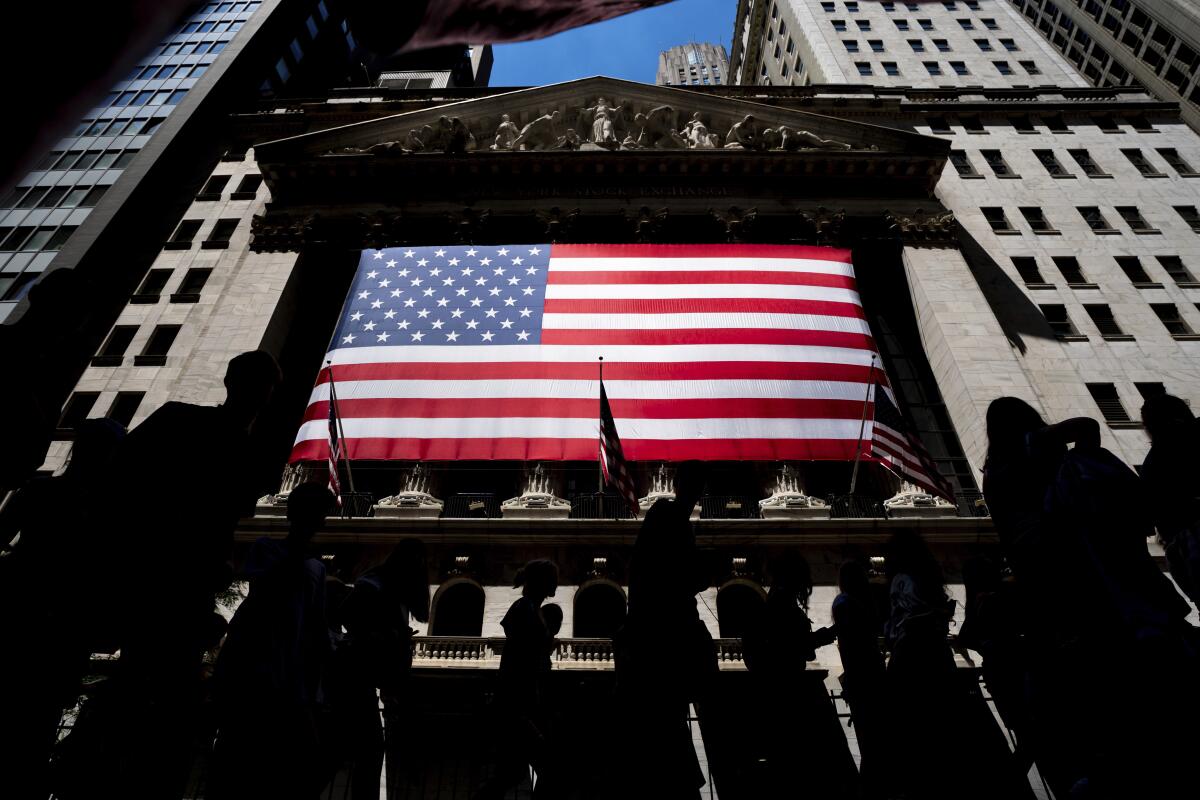Wall Street closes its best week of the year with even more gains

- Share via
Wall Street steamrolled even higher Friday as it closed out its best week in nearly a year.
The Standard & Poor’s 500 climbed 40.56 points, or 0.9%, to 4,358.34 and rose every day of the week. The Dow Jones industrial average gained 222.24, or 0.7%, to 34,061.32, and the Nasdaq composite jumped 184.09, or 1.4%, to 13,478.28.
Stocks have surged more than 5% this week on rising hopes the Federal Reserve is finally done with its market-crunching hikes to interest rates, which were meant to get inflation under control. Friday’s jobs report underscored that pressure is easing on inflation after it showed employers hired fewer workers last month than economists expected.
It’s a stunning turnaround from just a week ago, when Wall Street was reeling after the S&P 500 had fallen 10% below its high point for the year. That put Wall Street’s main index into what investors call a “correction.”
Since then strong profit reports helped drive some stocks to towering gains. Generac, a maker of backup generators, soared nearly 28% for its best week since its stock began trading in 2010. At Expedia Group, another stronger-than-forecast report sent its stock nearly 22% higher for its best week since the market was surging out of the coronavirus crash in early 2020.
But it was interest rates, yields and inflation that were at the center of all the wild movements for financial markets around the world.
Before this week, stocks had been struggling under the weight of rapidly rising Treasury yields. Those yields were in turn catching up to the Fed’s main interest rate, which is above 5.25% and at its highest level since 2001.
The nation’s employers slowed their hiring in October, adding a modest but still decent 150,000 jobs, a sign that the labor market may be cooling but remains resilient.
Higher yields slow the economy, hurt prices for investments and raise the risk of something breaking within the financial system, such as the three high-profile U.S. bank failures that rattled financial markets during the spring.
“It was really fear that the Fed was going to go too far,” said Katie Nixon, chief investment officer for Northern Trust Wealth Management.
The Fed put such pressure on the economy intentionally, hoping to starve inflation of its fuel. It wants the job market to cool, particularly the pay raises going to workers. The Fed fears that too-strong pay gains could create a vicious cycle that keeps inflation high.
Analysts said Friday’s jobs report offered encouraging signals for the Fed, with average hourly earnings rising less in October from September than expected, though it still doesn’t mean the job is done.
Treasury yields in the bond market tumbled immediately after the jobs report, releasing more of the pressure that had built up on Wall Street. The yield on the 10-year Treasury eased to 4.52% from 4.67% late Thursday and from more than 5% last week, when it hit its highest level since 2007.
After the monthlong trial, jurors rejected Bankman-Fried’s claim during four days on the witness stand in Manhattan federal court that he never committed fraud or meant to cheat customers.
Of course, this week’s sharp fall in Treasury yields could also end up hurting stock investors in the long run. Fed Chair Jerome H. Powell said this week that the central bank may not need to hike rates if the recent rise in yields stays “persistent.” Such high yields could slow the economy and push down on inflation by themselves, without requiring the Fed to hike rates again.
A swift regression in Treasury yields could make the Fed more nervous and encourage it to consider raising rates again. The 10-year yield in just a week has already eliminated its rise from all of October.
Plus, a slowing job market raises pressure on economic growth, and worries still exist on Wall Street about a possible recession even though the economy is strong at the moment.
Still, a slowing U.S. job market is exactly what investors wanted to see because it could persuade the Fed to halt its barrage of hikes to interest rates.
Traders are moving up expectations for when the first cut to interest rates by the Fed could happen, potentially by the summer, according to data from CME Group. Such cuts can act like steroids for financial markets.
For investors around the world, the “Fed matters more than other central banks,” and weak U.S. data is “the only game-changer for markets,” foreign-exchange strategists at Bank of America wrote in a BofA Global Research report.
Consumers’ resilience in the face of high inflation is expected to continue through the holiday season with retail sales expected to top a $957 billion, a record amount.
A separate report on Friday said that growth in U.S. services industries, such as finance and construction, was weaker last month than economists expected. Perhaps more important, the report from the Institute for Supply Management also suggested a slight easing in prices.
Excitement about a potentially easier Fed was more than enough to offset a fall for Apple, which is Wall Street’s most influential stock.
The most valuable U.S. stock fell 0.5% despite reporting stronger profit for the latest quarter than analysts expected. Analysts said investors were likely disappointed with Apple’s forecast for revenue for the last three months of 2023.
On the winning side of Wall Street was Cardinal Health. It rose 6.9% after a better-than-expected profit report.
Stocks indexes were mixed in Europe and higher across much of Asia.
AP writers Zimo Zhong and Matt Ott contributed to this report.
More to Read
Inside the business of entertainment
The Wide Shot brings you news, analysis and insights on everything from streaming wars to production — and what it all means for the future.
You may occasionally receive promotional content from the Los Angeles Times.













